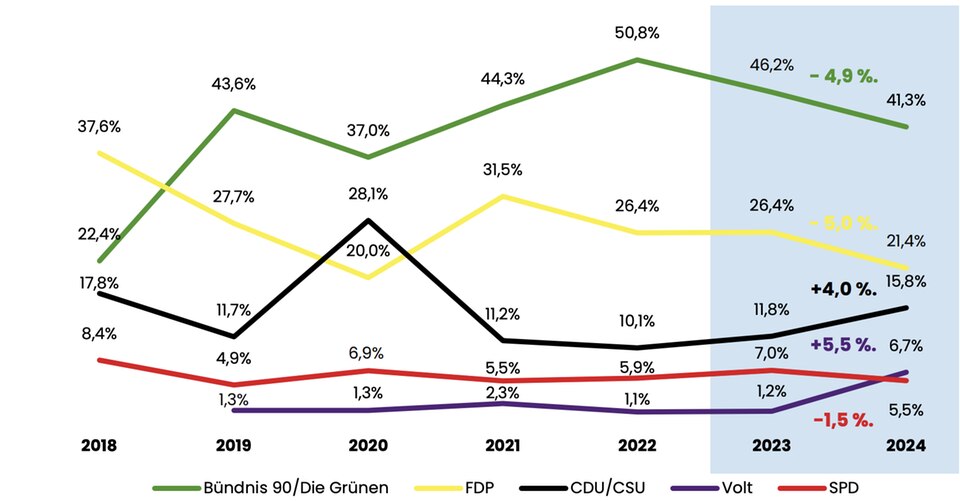The results of the Start-up Monitor show that the party political preferences of founders remain stable. Nevertheless, the governing parties are losing ground, and there is hardly any support for the AfD and BSW.
This is original content from the Capital brand. This article will be available for ten days on stern.de. After that, you will find it exclusively on capital.de. Capital, like the star to RTL Germany.
The start-up industry has not had an easy few years: rising interest rates and energy prices, a jungle of bureaucracy and a stagnating economy have cooled the mood among founders in Germany. According to a recent survey by the German Chamber of Industry and Commerce (DIHK), interest in starting a company has even fallen to its lowest level since 2010.
Nevertheless, founders who took part in the German Start-up Association’s survey on the political Sunday question remain stable in their party political preferences. The governing parties SPD, Alliance 90/The Greens and FDP lost a total of 11.4 percent compared to the previous year. Unlike in the general population, AfD and BSW hardly find any support. The results in detail:
Greens further ahead, Union and Volt winners
With 41.3 percent, the Greens are clearly in the lead. This means that they remain by far the strongest force among founders in the Start-up Monitor, but have lost 4.9 percentage points compared to the previous year. This means that their popularity is declining for the second year in a row; in 2022 they even achieved an absolute majority in the survey for the first time.
The FDP follows with 21.4 percent and a loss of 5 percentage points. Compared to the 2021 federal election year, it has even lost 10.1 percentage points; in 2018, it was even more popular than the Greens.

But there are also winners in this year’s survey. One is the CDU/CSU union, which is the third strongest party with 15.8 percent and an increase of 4 percentage points. In fourth place is the pro-Europe party Volt with 6.7 percent. With 5.2 percentage points, it is the strongest winner in the Start-up Monitor survey.
The start-up association has been conducting this survey annually in Germany since 2013. It is probably the largest mood test in the industry, but it is not representative. This summer, more than 1,800 founders and managing directors took part.
SPD defeated, AfD and BSW not in the Bundestag
The party that will be the chancellor, the SPD, will be lagging behind in 2024, with 5.5 percent, just about making it over the five percent hurdle. However, it will only lose slightly overall, as it has not enjoyed particularly high levels of support among start-up founders in the past.
“The results of the start-up survey disappoint me, but I am sure that we as the SPD can convince even more founders and I am committed to this,” says Verena Hubertz to Capital. She is deputy leader of the SPD parliamentary group in the Bundestag and previously co-founded the Kitchenstories platform. “Social democracy actually fits very well with the start-up DNA, because for me it means equal opportunities and advancement – regardless of your parents’ home or level of education,” says Hubertz.
In fact, founders are often better educated than the rest of the working population. This could also explain the survey results for AfD and BSW. Neither of them made it over the five percent hurdle in the Start-up Monitor: The AfD, which is classified as a suspected right-wing extremist case, received 3 percent, the BSW 1.4 percent.
According to a study by the German Institute for Economic Research (DIW), populist parties are mostly successful where the average age is high and income and education are low. However, according to the start-up association, the proportion of academics among founders is 85 percent, which is above average. According to the Federal Employment Agency, only a quarter of the employed population has an academic degree.
Financing and immigration are important topics for start-ups
Other parties are also more likely to address the issues that are politically relevant for start-ups. These include, above all, questions about financing and innovation, but also “immigration of skilled workers, social openness and sustainability,” says the Start-up Monitor. This is also evident in voting behavior.
AfD and BSW are also particularly successful in the eastern German states. However, most start-ups were founded this year in Berlin, North Rhine-Westphalia and Bavaria, according to the Start-up Detector database. Mecklenburg-Western Pomerania, on the other hand, comes in last place, and Thuringia and Saxony-Anhalt are also among the last five.
However, the DIHK survey underlines that currently few people in the entire country are motivated to start a business. The last time interest was as low as it is today was at least in 2010. According to the association, the reason for this is the enormous increase in operating costs and the thicket of bureaucratic regulations that reduce the desire to be an entrepreneur.
Germany as a location for start-ups was also repeatedly rated poorly in the survey, with an average grade of 3.6. Three quarters of those surveyed said that faster and simpler regulations were necessary. Two thirds were in favor of simpler tax law, and according to the DIHK there were also demands for better access to public funding and lower energy prices.
Source: Stern




